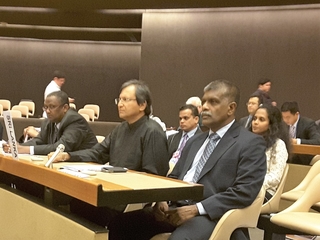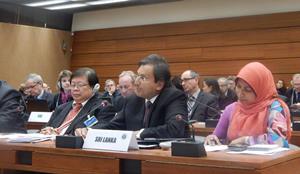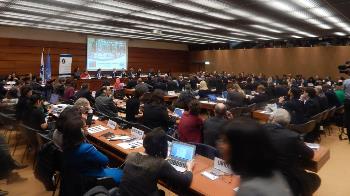
Sri Lanka participated in the 7th Meeting of the Convention on Cluster Munitions (CCM) entered into force in August 2010, held in Geneva on 4-6 September 2017, which opened today.
The attached statement was delivered by Sri Lanka’s Permanent Representative to the UN in Geneva Ravinatha Aryasinha.
Convention on Cluster Munitions (CCM) is an international treaty that addresses the humanitarian consequences and unacceptable harm to civilians caused by cluster munitions, through a categorical prohibition and a framework for action. The Convention prohibits all use, production, transfer and stockpiling of cluster munitions. In addition, it establishes a framework for cooperation and assistance to ensure adequate care and rehabilitation to survivors and their communities, clearance of contaminated areas, risk reduction education and destruction of stockpiles.
Sri Lanka’s delegation included Major General D S Weeraman psc, Brigadier W A N M Weerasinghe RSP USP and Ms. Dulmini Dahanayake, Second Secretary of the Sri Lanka Permanent Mission in Geneva.
4 September 2017
Sri Lanka Permanent Mission
Geneva

Sri Lanka said that it supports the establishment of a Group of Governmental Experts (GGE) on Lethal Autonomous Weapons Systems (LAWS) in 2017, within the framework of the Convention on Certain Conventional Weapons (CCW) and to elevate the dialogue on LAWS to a State –driven formal process.


Sri Lanka's Ambassador to the UN in Geneva Ravinatha Aryasinha expressing concern on the slow progress made over the decades on international multilateral nuclear disarmament efforts, has affirmed Sri Lanka’s support for the convening of a conference in 2017, to negotiate a legally – binding instrument to prohibit nuclear weapons, leading towards their total elimination. Sri Lanka further noted that the agreement on such a negotiation would ensure the fulfillment of the wish of the UN membership at large.
He made these observations during an intervention by Sri Lanka at the third and final session of the General Assembly mandated Open – Ended Working Group (OEWG) on Taking Forward Multilateral Nuclear Disarmament Negotiations, held in Geneva last week. During its final plenary meeting held on 19th August 2016, the Group adopted the report by vote, and recommend to the General Assembly to convene a Conference in 2017, to negotiate a legally – binding instrument, to prohibit nuclear weapons, leading towards their total elimination. The recommendation, which will be assessed by the General Assembly, is seen as a significant step towards nuclear disarmament.

Referring to the arguments made by some that “nuclear weapons are not illegal as per se and that the UN Charter has not excluded the possibility of using nuclear weapons in self – defense”, Sri Lanka said that such “existing lacuna in international law for not explicitly prohibiting nuclear weapons should not be taken as a cover to legitimize nuclear weapons, instead we should take it as a catalyst to work collectively in order to close the gaps and strengthen the international law.”
Sri Lanka’s Deputy Permanent Representative to the UN in Geneva, Mrs. Samantha Jayasuriya made these remarks on 11th May 2016 at the second session of the Open – Ended Working Group (OEWG) on Taking Forward Multilateral Nuclear Disarmament Negotiations, held in Geneva from 2-13 May 2016. She further added that a ‘step –by –step’ approach with an undefined ‘final stage’ tends to lose the momentum, and that any “undue delays in taking proactive actions or having to wait until a minimum threshold point is fulfilled by all nuclear possessing States, compromises the rights of States who are not relying on nuclear weapons for their security, and are being subjected to unfair risk of nuclear weapon detonations, accidental or intentional.”




Sri Lanka’s Permanent Representative Ambassador Ravinatha Aryasinha said on Wednesday (2 March 2016) that the Cabinet of Ministers earlier the same morning had approved that Sri Lanka accedes to the ‘Convention on the Prohibition of the use, stockpiling, production and Transfer of Anti-Personnel Mines and on Their Destructions’, which is commonly known as the ‘Ottawa Convention’.
Ambassador Aryasinha made this announcement when he addressed the First International Pledging Conference for the Implementation of the Anti – Personnel Mine Ban Convention on the theme “Mine Free World by 2025: The Last Stretch”, held yesterday (2 March 2016) at the Palais des Nation in Geneva. The pledging conference was organised by the Office of the UN in Geneva and the Government of Chile marking seventeen years of success and calling on all parties to redouble their efforts to meet the humanitarian goals set by the Convention by 2025.




Noting the legitimate right of the countries which have given up the nuclear-weapon option under NPT to receive legally binding security assurances against the use or threat or use of nuclear weapons under any circumstances, Sri Lanka urged countries which possess nuclear arsenals to rethink their approach towards national security in such a manner that the use of nuclear weapons is not envisaged in their national security doctrines.
Permanent Representative to the United Nations Office in Vienna, Ambassador A.L.A. Azeez made these observation on 7th May 2015 at the Main Committee I – Disarmament of the 2015 Review Conference of the Parties to the Treaty on the Non-Proliferation of Nuclear Weapons held in New York.
While noting the increasing role of the nuclear energy and nuclear technology for the socio-economic development of States, Sri Lanka expressed that there should be no obstacles placed on the path to peaceful uses, subject to accepted safeguard standards. Sri Lanka also noted the importance of civil nuclear cooperation, as an important tool for realising such peaceful uses by many countries.
Permanent Representative to the United Nations Office in Vienna, Ambassador A.L.A. Azeez made these observation on 7th May 2015 Main Committee III – Peaceful Uses of Nuclear Energy of the 2015 Review Conference of the Parties to the Treaty on the Non-Proliferation of Nuclear Weapons held in New York.

Sri Lanka reiterated its commitment to strive with all States and other Stakeholders, to make nuclear disarmament realizable and bring peaceful uses of nuclear technology within reach. While recognizing the inalienable right of peaceful use of nuclear technology as provided for in Article IV of the NPT, Sri Lanka also stressed the importance of shared responsibility of States to work toward eventual elimination of nuclear weapons. Sri Lanka also expressed caution on the over-emphasizing of the increasing role of nuclear security, particularly in an era where nuclear material and technology reaching the hands of non-state actors remains a distinct and dangerous possibility.
Dr. Rohan Perera, Permanent Representative to the United Nations in New York made these observations on 30 April 2015, at the 2015 Review Conference of the Parties to the Treaty on the Non-Proliferation of Nuclear Weapons (NPT). The Review Conference is being held from 27th April to 22 May 2015 at the United Nations Head Quarters in New York.

Sri Lanka has cautioned that "the possession of autonomous weapons by some States, combined with their possible asymmetric usages in war, may compel other States to also abandon their policies of restraint or moratorium and ignite an arms race". It has been noted that "the experience in nuclear weapons provides a useful lesson for all of us to understand the consequences of such an arm race, where even today possession itself has continued to remain a threat to regional as well as global security.
Sri Lanka's Ambassador to the UN in Geneva Ravinatha Aryasinha, made these observations during an intervention by Sri Lanka at the Meeting of Experts on Lethal Autonomous Weapon Systems (LAWS), held within the framework of the Convention on Certain Conventional Weapons (CCW) from 13-17 April 2015 at the Palais des Nations in Geneva. Second Secretary Mafusa Lafir participated in the deliberations. Earlier on Monday, Ambassador Aryasinha opened the week long meeting in his capacity as the Chair – Designate of the CCW for 2015.

Sri Lanka's Ambassador to the UN in Geneva Ravinatha Aryasinha, in his capacity as the Chair – Designate of the Convention on Certain Conventional Weapons (CCW) for 2015, opened the week long 'Meeting of Experts on Lethal Autonomous Weapon Systems (LAWS)', held within the framework of the CCW on Monday (13th April) at the Palais des Nations in Geneva. The Convention, which 120 States are party to, seeks to ban or restrict the use of specific types of weapons that are considered to cause unnecessary or unjustifiable suffering to combatants or to affect civilians indiscriminately.

Sri Lanka has been designated by acclamation to Chair the 2015 Meeting of the High Contracting Parties to the Convention on Certain Conventional Weapons (CCW). Ambassador Ravinatha Aryasinha, Permanent Representative of Sri Lanka to the UN in Geneva, succeeds Ambassador Remigiusz A. Henczel, the Permanent Representative of Poland to the UN in Geneva.
Accepting the honor conferred on Sri Lanka by the 118 High Contracting Parties to the convention at the conclusion of the week long CCW sessions in Geneva on 14 November 2014, Ambassador Aryasinha expressed appreciation to the Non Aligned Movement (NAM) for proposing Sri Lanka on behalf of the Group. He said, "I am deeply humbled by the confidence placed in Sri Lanka, and the recognition of Sri Lanka's contribution to the field of disarmament over many decades - through the the Indian Ocean as a Zone of Peace initiative, the Conference on Disarmament (CD), the Treaty on the Non-Proliferation of Nuclear Weapons (NPT), the International Atomic Energy Authority (IAEA), the Organization for Prohibition of Chemical Weapons (OPCW), and particularly since the ending of the terrorist conflict by its comprehensive demining programme, a key focus area of the CCW".


Sri Lanka's Ambassador to the UN in Geneva Ravinatha Aryasinha has said Sri Lanka stands ready to share its experience in comprehensive demining as a 'best practice' with countries which are facing similar challenges. Noting that "Sri Lanka’s continuing progress in demining has been achieved by telescoping what according to some estimates was to take 15 – 20 years, into one of 5 – 7 years duration, he said this was not only a rewarding experience for our people as they now move about freely across the country, but also a positive lesson for other conflict affected countries, where nationally owned and nationally driven programmes could achieve their intended purposes, if the necessary political commitment, resolve and pragmatic vision is put in place".
Ambassador Aryasinha made these observations when he addressed the 16th Annual Conference of the High Contracting Parties to Amended Protocol II on Prohibitions or Restrictions on the use of Mines, Booby-Traps and other Devices of the Convention on Certain Conventional Weapons (CCW) on Wednesday (12 November 2014) at the Palais des Nations in Geneva. The Convention on Certain Conventional Weapons came as a result of an increased international realization that the effects caused by certain conventional weapons may be excessively injurious and indiscriminate. The Convention and its Protocols together manifest a clear intention and commitment of the Contracting Parties to address this challenge effectively, through the adoption of national programmes and measures.

Sri Lanka's Ambassador to the UN in Geneva Ravinatha Aryasinha has asked that greater attention be paid in Global Counter Terrorism Strategy, to the role of terrorist support networks that take the form of front organizations, the challenge posed by the abuse of Information Communication Technology (ICT) and the propriety of the use or display of terrorist group emblems, insignia and symbols.

Sri Lanka's Permanent Representative to the UN in Geneva Ambassador Ravinatha Aryasinha, has called for "a balanced approach" in addressing the objectives of the Treaty on the Non-Proliferation of Nuclear Weapons (NPT). Noting that "Sri Lanka remains fully committed to the nuclear non-proliferation commitments of the NPT and have steadfastly and consistently supported the global initiatives on non-proliferation", Ambassador Aryasinha noted that "nuclear non-proliferation however remains one of three pillars of the NPT, which requires equal attention along with the other two - promotion of safe and secure use of nuclear energy for peaceful purposes, and nuclear disarmament". He said "such an approach which includes the implementation of the 13 practical steps agreed on to meet the disarmament commitments during the 2000 Review Conference to advance progressively towards the total elimination of nuclear weapons, is a necessary step on the road map to achieving the ultimate goal of a world free of nuclear weapons."
Ambassador Ravinatha Aryasinha, Sri Lanka's Permanent Representative to the UN in Geneva, addressing the Conference on Disarmament (CD) on Tuesday (05 March 2013), expressed the disappointment of Sri Lanka over the failure of the CD to reach consensus on its Programme of Work. He urged Member States to make concerted efforts to reach an early agreement on the Programme of Work. Ambassador Aryasinha highlighted that Nuclear Disarmament remains the highest priority of Sri Lanka in the work of the CD and that its international treaty obligations undertaken in the field of Disarmament are an indication of the country’s commitment to the elimination of the threat posed by nuclear weapons. Emphasizing the need to reach an early agreement on a universal, unconditional and legally binding instrument to assure non-nuclear weapon states against the use or threat of use of nuclear weapons, Ambassador Aryasinha said it is imperative to start negotiations for the complete elimination of nuclear weapons with a specific time frame.
Read Full Statement

Ambassador Ravinatha Aryasinha, Sri Lanka's Permanent Representative to the UN in Geneva, addressing the Conference on Disarmament (CD) on Tuesday (31 July 2012), has expressed Sri Lanka's "profound disappointment that the Conference has not been enabledto undertake substantive work on its agenda". He said, "it is time to avoid the temptation of subjecting the work of this Conference to the vagaries of changing international strategic landscape, and instead, to harness its potential to contribute towards enhancing cooperative security". Emphasizing the importance of the CD "as the sole multilateral disarmament negotiating forum of the international community", Ambassador Aryasinha said, "in order to continue to preserve the unique role of the Body, it is vital that all of us, the Member States, allow the Conference to begin its substantive work on the basis of a balanced and focussed Programme of Work, that takes into account security concerns of all its Members in an equitable manner, thereby ensuring its acceptance by consensus".

I call to order the 1061st plenary meeting of the Conference on Disarmament.
I have the honour to convey the following message of good wishes addressed to the Conference by the Minister of Foreign Affairs of Sri Lanka, Hon. Rohitha Bogollagama.
‘I have great pleasure in addressing this special message on the occasion of Sri Lanka’s assumption of the Presidency of the Conference on Disarmament. As a small, yet always engaged member State of the United Nations, Sri Lanka’s assumption of the Presidency of this Conference is yet another manifestation of its commitment to and belief in multilateral diplomacy as the indispensable means to address major global challenges and enhance the prospects of a stable, just and peaceful world. The Conference on Disarmament, as the sole multilateral negotiating body on disarmament matters has a proud history of codification and remains relevant in our constant endeavour to free the world from all weapons of mass destruction.